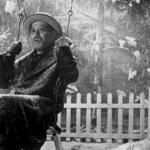Review of The House of the Long Shadows, Directed by Pete Walker
Sure, Wuthering Heights was fine for its day, but the modern novel has progressed beyond that. In fact, these days anyone with even a tiny bit of talent could sit down and crank out that sort of gothic tripe in less than a day! At least, so claims modernist writer Kenneth McGee—an author interested only in telling the truth and making money (not necessarily in that order). But when his publisher bets McGee that he can’t write such a novel in 24 hours, McGee (played by Desi Arnaz, Jr.) finds himself seeking the appropriate writing atmosphere in an abandoned mansion. And atmosphere he gets in spades, when Grand Moff Tarkin, Saruman, Kung Fu’s Dad, and Vincent Price all show up at that same house on that same dark and stormy night. Awesomeness ensues in the otherwise obscure film The House of the Long Shadows (the only film featuring Peter Cushing, Christopher Lee, John Carradine, and Vincent Price).

If you couldn’t tell from the description above, this movie has more plot twists than a belly dancer’s torso. Just when we think we’ve got a handle on the plot, Peter Cushing reminds us of the “tewwibwe suffewing” he’s gone through. Or Vincent Price sweeps in, gives a monologue on decay, and much to the viewer’s delight verbally slaps down Desi Arnaz, Jr (“Don’t interrupt me whilst I’m soliloquizing!). Or Christopher Lee rolls his eyes in frustration at the squatters on what will soon be his shopping mall. Or, well, you get the point. It turns out that movie does in fact have as much complexity as Wuthering Heights, if not always the same literary quality.
Despite the fact that this is a campy horror flick from the 80s, it actually makes a point that Christians have a vested interest in hearing. The character development McGee goes through (which admittedly is far beyond Arnaz’s acting range—the whole time you can’t help but think that we should see a lot less of him and a lot more of any of the other actors in the film) is basically the realization that the old gothic stories are just as good as anything modern writers put out today.
The obvious parallel in The House of the Long Shadows is with film. True, horror movies in the 80s are different than they were in the 50s and 60s, but that doesn’t mean that we should just dismiss the classics. Cushing, Lee, Carradine, and Price made movies that we just as good as anything cranked out by a Wes Craven, a Sam Raimi, or a John Carpenter. (A point which I suspect Craven, Raimi, and Carpenter would all agree with.) Just as novels of the past are as good as novels of the present, so we shouldn’t dismiss the quality of yesterday’s horror just because times and technology have changed.
But what does this have to do with Christians? I think that in the modern Evangelical world, we all too quickly rush to embrace whatever happens to be new. The new book by the celebrity pastor, the new meaning discovered in Paul, a new way of applying the Old Testament law to everyday life. Time and again we grab on to a belief just because it’s five minutes younger than the one we held yesterday. And while there certainly are good books being written, good theology being developed, and good application coming from the best modern preachers, none of this means that we should dismiss the beliefs of the past. In fact, those beliefs are not only just as good as but may even be better than anything being thought up today.
So here’s my formal suggestion, with all the weight and authority I can put behind it (lots of weight, not much actual authority): we should never believe anything that hasn’t been believed by a dead Christian. This of course means that we need to be reading books by dead Christians, and mulling them over, and talking about them with other Christians, and working very hard at developing a solid interpretation of Scripture. If the heart of Christianity is the historical life, death, and resurrection of Jesus Christ (and it is), then it makes sense that we are not the only generation who knows the truth, and that there is much we can learn from those who have gone before us.
So enjoy a good classic horror movie, but enjoy good classic theology as well. You be richly blessed by both!
Dr. Coyle Neal is Assistant Professor of Political Science at Southwest Baptist University in Bolivar, MO. Woe betide the student who interrupts him whilst he is soliloquizing!












